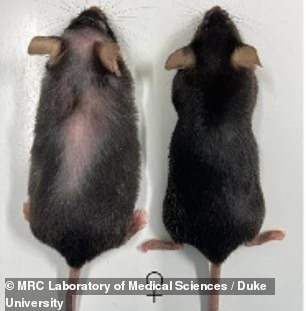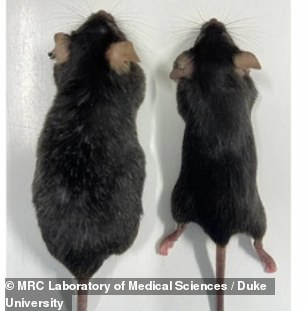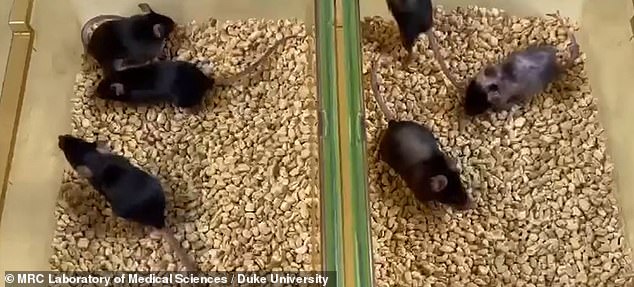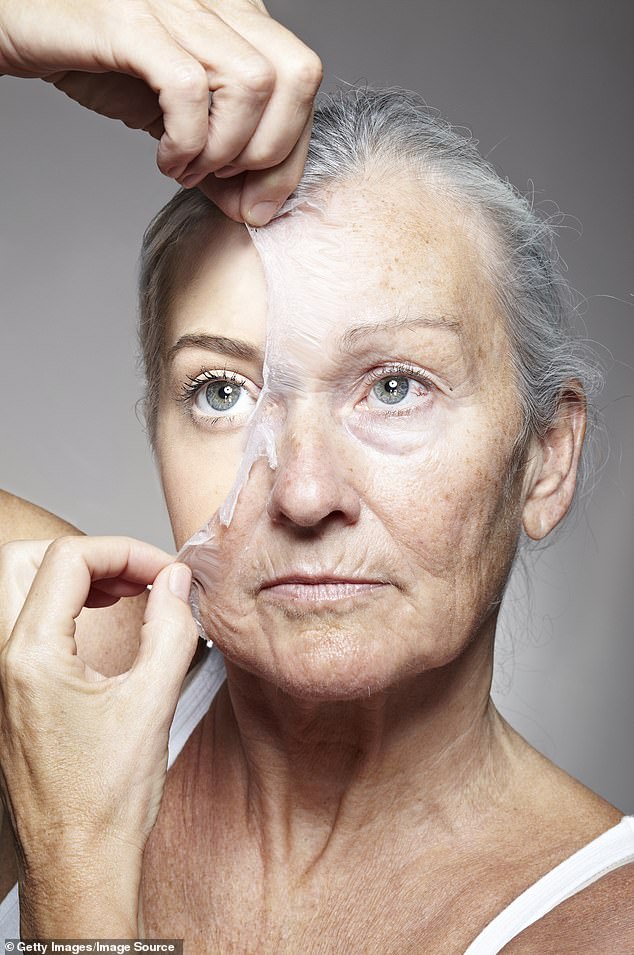Experts create anti-aging holy grail drug that extends life 25% and prevents cancer and gray hair
Scientists are one step closer to unlocking the secrets of anti-aging.
They announced the development of a holy grail drug that disables a protein linked to accelerated aging. They found that the treatment extended the lifespan of rats by 25 percent.
Within 25 weeks of therapy, the animals had a lower risk of cancer, no more gray hair, better vision and better muscle function.
The 75-week-old animals, equivalent to a 55-year-old human, lived an average of 155 weeks, compared to 120 weeks for the untreated animals.
Humans inherited the protein, called interleukin-11, from fish about 450 million years ago.
The gene is associated with chronic inflammation, scarring of organ tissue, metabolic disorders, muscle loss and cardiac fibrosis.
The 75-week-old animals, equivalent to a 55-year-old human, that received the drug (right) lived an average of 155 weeks, compared with the 120 weeks of the untreated animals (left).
“These findings are very exciting,” said Professor Stuart Cook, co-corresponding author from the UK’s Medical Research Council Laboratory of Medical Science (MRC LMS).
‘The treated mice had less cancer and showed no signs of aging and frailty. However, we also saw less muscle loss and an improvement in muscle strength.
‘In other words, the old mice that received anti-IL11 were healthier.
‘Although these findings were only made in mice, it is possible that the drugs could have a similar effect in older people.
‘Anti-IL-11 treatments are currently being tested in human clinical trials for other conditions, which may provide interesting opportunities to study their effects in aging people in the future.’
Professor Cook said BBC that although the study is not yet complete, the data indicate that the drug is safe for humans.
The team conducted two experiments for their research, the first genetically modifying rats to eliminate IL-11.
Removal extended the lifespan of animals by an average of more than 20 percent.
However, the “drastic” results were seen when they injected an anti-IL-11 drug, which stopped the protein from causing aging-related effects in the body.


The team designed a holy grail drug that turns off a protein linked to accelerated aging, and found it extended the lifespan of rats by 25 percent
Both male and female rats had up to a 25 percent longer lifespan.
Not only did the treatment protect against chronic disease and the age-related loss of muscle mass and strength, the therapy also reduced the rate of telomere shortening.
Telomeres are the caps at the end of each chromosome that hold the chromosomes together.
As we age, telomeres wear down and shorten, leading to diseases such as cancer, Alzheimer’s and Parkinson’s.
“Our goal is that one day anti-IL-11 therapy will be used as widely as possible, helping people around the world live longer, healthier lives,” said Professor Cook.
‘However, this is not easy, because the approval processes for anti-aging drugs are not well established. Moreover, it is very difficult to raise money for clinical trials in this area.’
The researchers have been studying IL-11 for years and in 2018 were the first to demonstrate that IL-11 is a profibrotic and pro-inflammatory protein. In doing so, they put an end to years of incorrect characterization as antifibrotic and anti-inflammatory.

The drug is being tested in patients with pulmonary fibrosis, a condition in which the lungs become scarred and it becomes difficult to breathe.

Professor Cook said that although the research is not yet complete, the data suggests the drug is safe for humans.
“This project started in 2017, when one of our collaborators sent us tissue samples for another project,” said Associate Professor Anissa Widjaja, co-corresponding author, of Duke-NUS Medical School in Singapore.
‘Out of curiosity, I did some experiments to check IL-11 levels.
‘The measurements clearly showed that IL-11 levels increased with age. That’s when we got really excited!
‘We found that these elevated levels contribute to negative effects in the body, such as inflammation and the prevention of healing and regeneration of organs after injury.
‘Although our research was conducted in mice, we hope that these findings are highly relevant to human health, as we have seen similar effects in studies of human cells and tissues.
“This research is an important step in better understanding aging. In mice, we have demonstrated a therapy that could potentially extend healthy aging by reducing vulnerability and the physiological manifestations of aging.”
